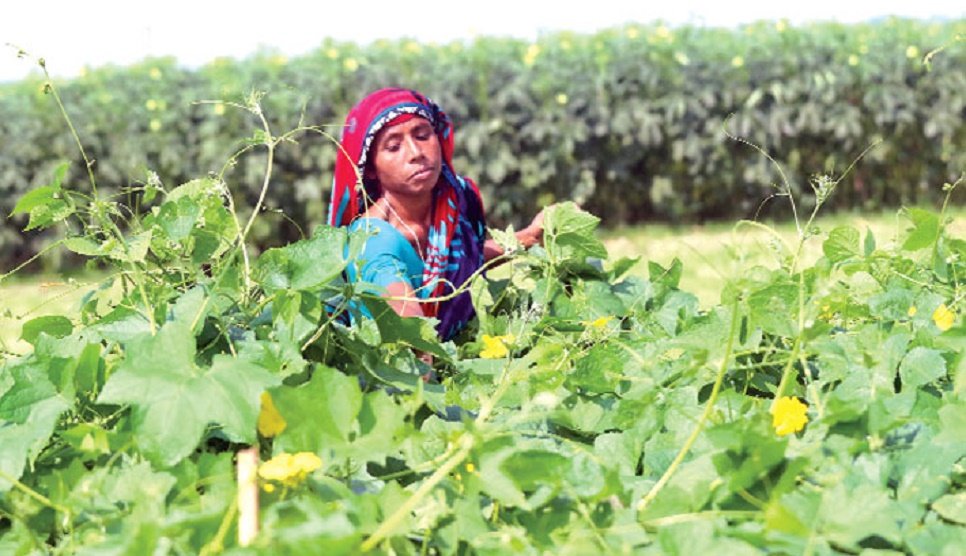Rajib Kanti Roy, Bangladesh: Women’s participation in economic activities in rural areas of Bangladesh has been increasing gradually though they remain unpaid or poorly paid and hardly recognised for their contributions.
The ratio of working women to men engaged in agriculture is almost double. But, most of them don’t own the lands they work in, and consequently their counterparts have greater command over them.
When it comes to women’s wages from farm labour, they get a very less amount of money than men earn for the same jobs.
The household work of rural women is not assigned with a monetary value despite the total domestic work carried out by women in Bangladesh is equivalent to 10.75 per cent of the gross domestic product (GDP) of the country.
Gender specialist and professor of Agricultural Economics at Bangladesh Agricultural University Ismat Ara Begum observes that there is no alternative to appreciating and recognising the role women play to boost the rural economy.
“Women’s contribution to ensuring food security and maintaining the growth of rural economy was enormous during the pandemic and their roles will be crucial in tackling the probable impacts of future recession. Therefore, their works should be appreciated and they should be recognised properly,” she said.
According to the labour force survey conducted by Bangladesh Bureau of Statistics (BBS), of the total 12 million women workers in Bangladesh, 77 percent (about 92,40,000) women are involved in rural agriculture, fisheries and social forestry.
Some 59.7 percent of working women and 32.2 percent of working men are engaged in agriculture, the BBS findings said.
Manusher Jonno Foundation (MJF) has revealed in a study titled ‘Putting Women in the Centre of Agriculture’ that the participation rate of women in rural labour has increased by 10 percent compared to men in the last 25 years.
Director General of Department of Agricultural Extension Md Benojir Alam observes that the number of women in agriculture is increasing due to various steps taken by the government.
“Now it is mandatory to have 30 percent women for training in commercial agriculture programmes and projects of the government. The participation of women is also increasing due to the encouragement of fruit production and poultry rearing in and around the house yard,” he said.
Despite the rise in the number of women contributing to rural economy, only 29 percent of the total rural women get wage for their works. The rest remain invisible as part of the family labour force despite being engaged in various unpaid household chores.
Women farm workers also become the victim of huge wage discrimination as they are considered less productive than men.
According to the MJF study, a woman worker earns only Tk 182 to 214 while her male counterpart earns Tk 285 to 352 for the same job.
Women, in most cases, are not allowed to take their own decision. The MJF report says only 35 percent women involved in food grain production, 33 percent engaged in producing crops for sale, 33 percent in fish farming and 20 percent women involved in poultry-cattle farming can make decisions themselves.
Economic experts believe that lack of land ownerships hinders women’s decision-making ability.
Sharmind Neelormi, an associate professor of Economics at Jahangirnagar University, presented a 20-year comparative picture of land ownership in a research paper titled ‘Women in Rural Economy: Bangladesh Context’.
According to her study, in 1993 the land ownership ratio between man and women in Bangladesh was 98:2 percent while in 2013, men’s ownership of land stood at 96.52 percent and women’s at 3.48 percent.
Agriculturist Dr Md Jahangir Alam has written in his recent article ‘Women in Agriculture’ in ‘Krishikotha’ published by Agriculture Information Service (AIS) that now men still have 81 percent ownerships in farmland and women own rest of the 19 percent.
Centre for Policy Dialogue (CPD) Senior Research Fellow Towfiqul Islam Khan has said women are deprived of due respect despite playing a big role in the agriculture sector’s contribution to GDP.
“Women don’t get government benefits, agricultural cards, subsidies, loans due to lack of land ownership. In case of leasing or borrowing land for cultivation, agreements are made with men. As a result, women hardly enjoy the economic benefits of their works,” he said.
Khan has emphasised the need for changing the social attitude as well as taking measures at public and private levels to involve women in the marketing system.

